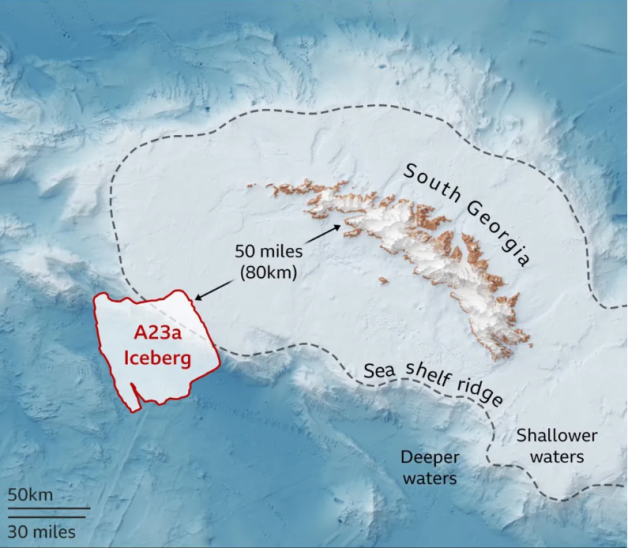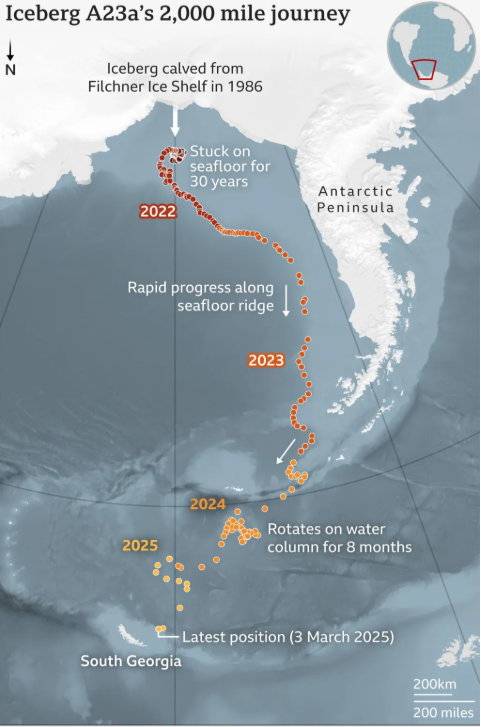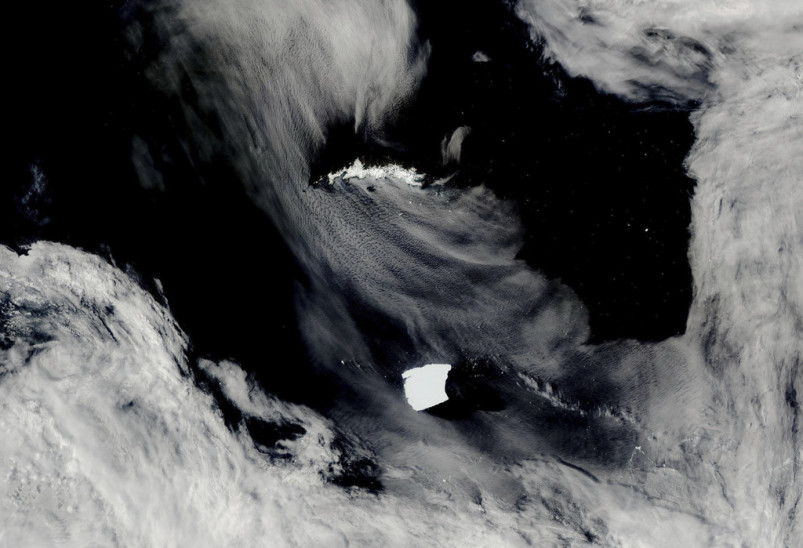The iceberg, which is almost twice as much as London’s size, seems to have stuck and probably will begin to dissolve
The world’s largest iceberg stuck in shallow waters off the remote British island southern Georgia in the Atlantic Ocean, where millions of penguins and seals live.
The iceberg, which is almost twice the size of London, seems to have stuck and will probably begin to dissolve on the southwestern coast of the island. Fishermen are afraid that they will be confronted with huge pieces of ice and this could affect some Macaroni penguins that feed on the area.
But scientists in Antarctica claim that huge amounts of nutrients are in the ice and that as it melts, it could create a “explosion” of life in the ocean.
“It’s like throwing a nutritious bomb in the middle of a desert license“, Says Professor Nadine Johnston of British Antarctic Survey.
THE Ecologist Mark Belchier, who advises the Southern Georgia government in the Atlantic Ocean said: “If it breaks, the resulting icebergs likely will be a risk to boats as they move to local currents and could limit the access of the vessels to local fishing areas“
The fact that he “stranded” in the shallow waters The iceberg is the last overturn in a nearly 40-year-old story that began when a large piece of ice was detached from Filchner-Ronne in 1986.
We watched his journey into satellite photos from December, when he was finally released after being trapped in a vortex ocean.
As they moved north through the warmer waters with the nickname Iceberg Alley, it remained impressively intact. For a few days, it even seemed to rotate on the spot before accelerating in mid -February traveling about 48 km a day.
“The future of all icebergs is that they will die. It is very strange to see that A23A has endured so much and has lost only one quarter of its extent“, Professor Huw Griffiths said, speaking to BBC News from the Polar Research Ship Sir David Attenborough in Antarctica.
On Saturday, the 300 -meter iceberg hit the shallow continental shelf, about 50 miles (80 kilometers) on land and now seems to have stuck firmly at that point.
“It will probably remain a little too much where it is, until the pieces are broken“, Says Professor Andrew Meijers of the British Antarctic Survey.
The tides will shake the iceberg up and down, and wherever the shelf rests, it will move back and forward, eroding the rock and ice.
“If the ice underneath is rotten – corroded by salt – it will be crushed and perhaps drifted somewhere shallow“Says Professor Meijers.
In 2004, an iceberg in the Ross Sea area influenced the breeding of penguins, causing increased deaths. However, experts now believe that most of the birds and animals in southern agriculture will not have the same fate. Some spaghetti penguins, fishing in the area affected by the iceberg, may be affected by decreasing food as the iceberg melts and mixes fresh water with the seafood, reducing the amount of food such as the rail. This can force penguins to move to other areas for food, increasing food competition. In addition, the ice can close the ports and affect the fishing season. Despite the challenges, preparations are at a good level for managing the situation.
On the contrary, scientists working in Antarctica note the positive consequences of icebergs in marine life. Researchers study the flow of nutrients released from ice, melting, which support productive ecosystems, supplying species such as the blue whale. This release of nutrients, visible through the increase in phytoplankton around the icebergs, is a natural process. However, climate change can cause more icebergs to be detached and faster melting, upsetting the standards of wildlife and fishing in the area.
Source: Skai
I have worked as a journalist for over 10 years, and my work has been featured on many different news websites. I am also an author, and my work has been published in several books. I specialize in opinion writing, and I often write about current events and controversial topics. I am a very well-rounded writer, and I have a lot of experience in different areas of journalism. I am a very hard worker, and I am always willing to put in the extra effort to get the job done.













